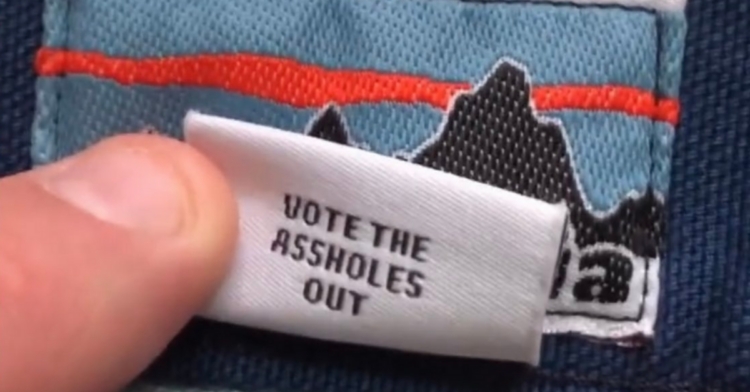As most people who’ve celebrated Thanksgiving with their families over the last few years can attest, we seem to be wearing our politics on our sleeves more frequently than ever before.
And while some brands may remain apparently risk-averse in this way, we’ve seen many others take a stand with mixed results. Although it seems so long ago now, you may recall that some people were destroying their Keurig coffee makers and burning their Nike attire in response to these companies respectively pulling their ads from Sean Hannity’s show on Fox News and featuring Colin Kaepernick in their ads.
In the case of Nike, this turned out to be a high-risk, high-reward proposition as their initial 3% drop in shares eventually gave way to a surge in online sales, sold-out sneakers featuring Kaepernick’s face, and an Emmy win.
But while one could argue that Nike was merely taking a calculated risk, the latest stunt from Patagonia is well in line with what the company’s been up to besides selling clothes.
One thing that Patagonia has made very clear in recent years is that they’re a company with deep concerns about environmental sustainability.

If one were to visit their website, they’d likely come across their page detailing the brand’s efforts to support climate activism.
And one of the first things that would jump out at visitors would likely be this image.
With this in mind, the more aggresively-worded tag that is now making the rounds across social media seemed like it could be plausible.
While it doesn’t contradict their previous messaging, some still saw clear reason to wonder whether the company genuinely added tags saying this to their clothing.
However, GQ has since reached out to Patagonia’s Director of Copy Brad Wieners, who confirmed the label is indeed real and appears on their Regenerative Organic Stand-Up Shorts that first came on the market in 1973.
As he said, “We have been standing up to climate deniers for almost as long as we’ve been making those shorts.”
While some were amused and excited by the bold tag, others were less convinced of the intentions behind it.
As this person saw it, Patagonia was simply making a performative statement to net them good publicity.
Yet if a representative from Patagonia saw this statement, they’d likely be eager to show exactly what the company is doing to provoke change.
Although this is a relatively small example, last year saw more strict policies on which organizations Patagonia would enter co-branding deals with.
As Buzzfeed News reported , this was a response to a popular look among tech and financial executives that has been nicknamed the “power vest.”
In a rejection message to a financial organization Patagonia had previously partnered with, a representative from the brand said they were “reluctant to co-brand with oil, drilling, dam construction, etc. companies that they view to be ecologically damaging.”
In a grander example of their commitment, Patagonia sued the Trump Administration for its decision to scale back the land in Utah designated as national monuments.

This saw the protected land in the Bear Ears national monument reduce by 85%, while the Grand Staircase-Escalante national monument was reduced by almost half.
As Patagonia CEO Rose Marcario wrote in an article for Time , part of the reason why the brand challenged this decision in court was that the power to manage federal lands is vested in Congress. And while the president can create national monuments to protect federal land, he’s not legally empowered to erase the national monuments of previous presidents.
So if there was any doubt as to who Patagonia wanted voted out, there shouldn’t be now.
















































